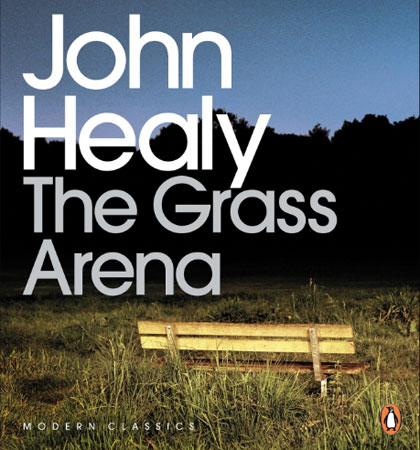IT WAS 1972 when I left behind a life of alcohol and violence. I had been introduced to the game of chess in prison by an inmate called the Brighton Fox. The game captured my mind and changed my life.
Coming from the lowest sub-culture in the world of the wino jungle to playing chess with elitist academics was a big leap, after my release. But my saving grace was the competitiveness of the chess environment because it forbade too much talking.
Unfortunately, I left it too late in life to attain a Grand Master’s title and I decided to give chess up. It was causing me extreme stress. So after a while I was more or less back on the street again. I’d no room and no peer group.
I started to mix with a group who were a higher form of low-life. They used to run scams with post office books and used a public toilet as their office.
I spent about 10 years with them but I didn’t fit in: I wasn’t smoking. I wasn’t drinking. I felt I was going nowhere.
But throughout this period, The Grass Arena was going around in my head. My experiences of life on the street and in London’s parks were in technicolor.
I managed to pick up a gardening job working for these rich people in Highgate and one day I seen a book on a chair, called The Outsider. The title intrigued me.
The opening line: ‘Mother died today’ grabbed me. It made me want to write but the only thing I had written previously was a short piece from prison about a chess Grand Master.
I was so in love with the analysis, sacrifices and tactics of the game that I got this urge to write on the subject, one that wouldn’t go away. It was immediately published in a chess magazine.
Afterwards I didn’t think much about writing or even that I was a writer. I felt somebody with my background wasn’t allowed to be a writer.
I’d never heard of any working-class writers. The class system in Britain was so rigorous then, and now even, that I didn’t feel encouraged to write. The block was psychological.
On top of that, I had no encouragement and it’s just useless without encouragement in this life, for anyone.
But after reading The Outsider, the urge was so powerful and I began to write about about four pages a night in long hand. It carried on like that for 12 months, which is a relatively short time for a memoir set over 15 years.
'The currency I had traded in was violence and drink'
My experiences from the street were so embedded in my head that it was all I could talk about. I had no life outside the book. But I felt I had to find a way to underwrite the violence so it mingled with the story. Who would want to read about drunks in the park?
My challenge was to involve the reader so they’d live the experience. I didn’t want to write violence and sex solicitously, but at the same time I couldn’t escape reality.
The currency I had traded in was violence and drink. I wanted to convey the grass arena in a way that the reader felt the full force of that experience, in the same way that Jack London’s The Call of the Wild had placed my imagination at the centre of the story.
Because I had lived the experience, you might feel that it was quite easy to write this story but I couldn’t remember everything. Like lots of winos I used to get extreme blackouts.
Of course people asked how anyone who drank like I did and experienced memory blanks would remember anything?
But any intelligent person knows that you put down what you do remember and what I don’t remember isn’t there.
People ask me now about some of the characters in the book, was I tempted to change any of their stories to protect them. There were some things I softened. There were some things I didn’t put down.
But it wasn’t to protect anyone… they were my people; we were all the same so I just changed the names. It was that simple.
By the time I got to the first edit I realised that this was the real skill of writing.
Everyone has a story more or less, but the edit is the thing that distinguishes great writers from not so great writers.
Thinking of a name for the book took a bit more work.
Nothing suited.
Then out of the blue I remembered a book I read about ancient Rome and the gladiators. It was set in the time of Nero, the people were starving but the Games were still going on.
There was a passage about a Harbour Master in Alexandria. He asked should he load the boats with food for the people or sand for the arena? He was told: ‘You fool, load the boats with sand for the arena.’
Translated from Latin into English, arena means sand. The surface of our arenas was grass. After that the title was easy.
When I’d finished writing I felt my work was as good, or better than, what was on shelves in any book shop. I felt my talents had been released.
I believe that people are born with different abilities but if you are not in the right environment they won’t come out.
In the grass arena I was defending my life all the time. The stress I was under meant these abilities never had the chance to reveal themselves.
This changed when my tension was relieved and my life became easier. These talents and abilities were released.
I had a problem, however. The only people I could go to in the publishing world were the middle class.
'They wanted the book but… they didn’t really want the writer'
I was recommended to people who had connections with the Arts but after three months nothing had happened. I don’t think they really wanted to help.
It was then that I happened upon a woman called Jo Spence who was a working-class artist. She was getting treatment at a clinic where I’d a job cutting the grass.
Usually people never stopped to talk to me when they came out, but she stopped.
We started talking and I told her about my book. It transpired that she used to be a secretary for Colin MacCabe at the British film Institute. She took my manuscript and put it in his in-tray.
MacCabe only read film scripts but he told me afterwards that he picked up The Grass Arena and couldn’t put it down. He was a professor of English literature who knew the worth and value of the prose so quickly brought it to the attention of Faber and Faber.
But nothing happened for about nine months.
In the end Jo Spence got on to them and asked whether they wanted the book or not? Their reply was: ‘Well, is it true?’
I decided I needed to get some letters from a chief probation officer I used to deal with. At the same time Fabers had been doing their own research — they wanted the book but I got the impression they didn’t really want the writer. I was the stranger in their midst.
Still, in their own words the book was: ‘A sell-out sensation.’
I remember the first time I picked up a copy, I didn’t really feel any great sense of satisfaction because I’d be working on the book for so long and had been involved so closely in the publishing process.
Months later, the book won the JR Ackerly award, Britain’s most prestigious prize for literal autobiography. It’s the only book in the history of the prize to win the award outright.
There was huge publicity. I must have been on every chat show in England: Jonathan Ross, Newsnight, Channel 4 News. It was a happy time. Success brings happiness but it also brings stress and the kind of attention I just wasn’t used to.
My relationship with Fabers was an arms-length friendship but by now they’d stopped dealing with me directly. The end came fast.
I was talking to the Translation Rights woman on the phone and I told her in passing that I’d like to chop their heads off with an axe. It was something said in frustration, nothing more, but it was relayed back.
The police called to my home the next day. It felt like that first line of Kafka’s The Trial: ‘Someone was telling lies about Joseph K, he knew he had done nothing wrong, but, one morning, he was arrested.’
They sent a memo around their staff telling them to destroy the rest of my work and deem the book out of print. I felt their attitude was very high-handed because literature doesn’t belong to the writer once it is published, it belongs to the nation.
It was a bad period. I got very down. It can be a fashionable burden for a middle-class writer to be put out of print in a foreign country but that was not the case with me. I was out of print and that was it.
This went on year after year. I was really angry but my will to write wasn’t destroyed. I couldn’t help myself even though I had no chance of getting any further work published.
'The greatest compliment my work has received came from a prison inmate'
I didn’t think it would take 20 years to republish The Grass Arena. An American, Adam Freudenheim, took over Penguin Classics. He republished the book immediately, describing it as a masterpiece.
I do feel The Grass Arena has come to define me because I’m still out of print in Britain. I cannot get republished here with my other works like The Metal Mountain or The Glass Cage.
A couple of years ago I wrote a book about the chess world called Coffeehouse Chess Tactics and I had to go abroad to get it published.
Despite this, it ended up being shortlisted for the Guardian Chess Book of the Year in 2010.
It’s very frustrating especially when I think about some of the accolades The Grass Arena has received but it’s funny, the greatest compliment my work has received came from a prison inmate.
I was invited to a prison to read and as I stood in the hall waiting to start, a guy at the front, with a big scar down his face, told me he’d committed a crime so he could be present for the reading.
The Screws said he had got out the week before and apparently he broke a window to get back in.
Things like that stick in your mind and I am proud of the book because it reveals a side of life in Britain that was largely unknown up to publication.
I have been asked whether the extremity of my experience makes the book what it is, but if so, where did the ability to write it come from? It’s the same ability that allowed me to play four games of competitive chess simultaneously.
These things were only revealed when I was 30.
I can’t see into the future, that’s not one of my talents, but I have ambitions to see some of my other work in print.
One day soon. I live in hope.




